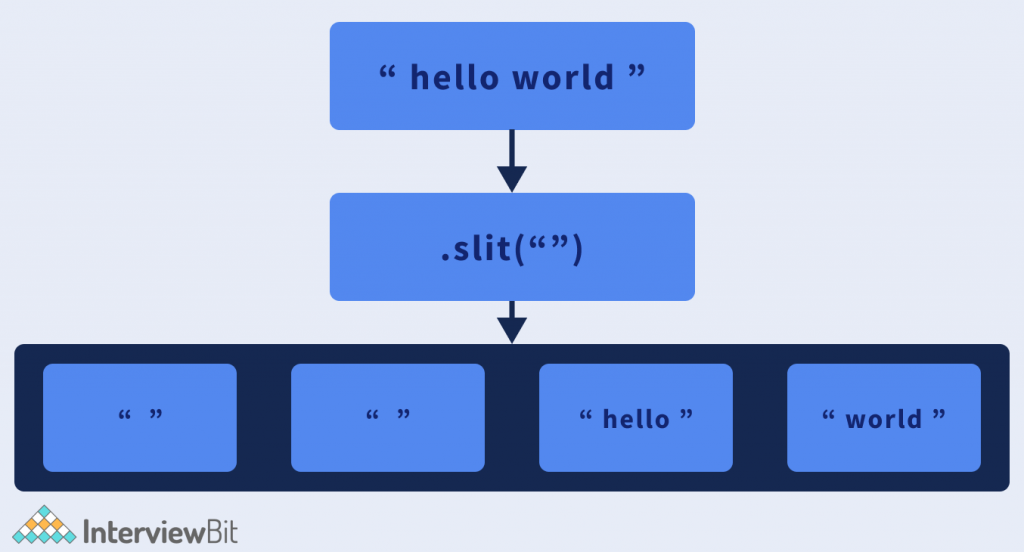Problem Statement
Given a sentence of the form of words separated by spaces, return a new sentence that consists of the words of the original sentence in the reverse order.
Sample Test Cases
Input 1:
s = “Hello World”
Confused about your next job?
Output 1:
World Hello
Input 2:
s = “This is a good day”
Output 2:
day good a is This
Approach
Naive Approach

The naive approach for this problem is to split the string into individual words using the spaces as delimiters, and then print the words in reverse order.
Code / Implementation:
C++ Code
string reverseStringByWords(string s) {
vector < string > words;
string word = "";
for (char c: s) {
if (c == ' ') {
words.push_back(word);
word = "";
} else {
word += c;
}
}
words.push_back(word);
string ans = "";
reverse(words.begin(), words.end());
for (auto x: words) {
ans += x;
ans += " ";
}
return ans;
}Java Code
public static void reverse(char[] ch, int left, int right) {
while (left <= right) {
char temp = ch[right];
ch[right] = ch[left];
ch[left] = temp;
left++;
right--;
}
}
public static String reverseByWords(String s) {
char[] ch = s.toCharArray();
int beg = 0;
for (int i = 0; i < ch.length; i++) {
if (ch[i] == ' ') {
reverse(ch, beg, i);
beg = i + 1;
}
}
reverse(ch, beg, ch.length - 1);
reverse(ch, 0, ch.length - 1);
String ans = Arrays.toString(ch);
return ans;
}Python Code
def reverse(s, left, right):
while left <= right:
s[left], s[right] = s[right], s[left]
left += 1
right -= 1
def reverseByWords(s):
s = list(s)
n = len(s)
beg = 0
for i in range(n):
if s[i] == " ":
reverse(s, beg, i - 1)
beg = i + 1
reverse(s, beg, n - 1)
reverse(s, 0, n - 1)
s = "".join(s)
return sComplexity Analysis:
- Time Complexity: O(n)
- Space Complexity: O(n)
Optimal Approach
The optimal approach tries to swap the words of the string from the beginning and end, using a two-pointers-based approach, to reverse the string in constant space. The algorithm is as follows:
- Convert the string into an array of strings, which will store the words.
- Initialize the 2 pointers left and right to 0 and string.length() – 1 respectively.
- While the left pointer does not exceed the right pointer, swap the elements at the left and right pointer, move the left pointer forward and the right pointer backward by 1 place.
- Finally, return the final calculated string.
Implementation:
C++ Code
string reverseByWords(string s) {
vector < string > words;
string str = "";
for (char c: s) {
if (c == ' ') {
words.push_back(str);
str = "";
} else {
str += c;
}
}
words.push_back(str);
int left = 0, right = words.size() - 1;
while (left <= right) {
swap(words[left], words[right]);
left++;
right--;
}
string ans = "";
for (auto x: words) {
ans += x;
ans += " ";
}
ans.pop_back();
return ans;
}Java Code
public static String reverseByWords(String s) {
String[] words = s.split("\\s");
int left = 0, right = words.length - 1;
while (left <= right) {
String temp = words[left];
words[left] = words[right];
words[right] = temp;
left += 1;
right -= 1;
}
String ans = String.join(" ", words);
return ans;
}Python Code
def reverseByWords(s):
s = s.split(" ")
left = 0
right = len(s) - 1
while left <= right:
s[left], s[right] = s[right], s[left]
left += 1
right -= 1
s = " ".join(s)
return sComplexity Analysis:
- Time Complexity: O(n)
- Space Complexity: O(1)
Practice Problem:
FAQs
1. When a problem is asked to be solved in constant space, what should be the thought process?
A. While the idea may vary from problem to problem, swapping is a very common method used in problems requiring to be solved in constant space.
2. What is the time complexity of the swap function in C++?
A. The swap function in C++ works in O(1) time complexity.







 Join WhatsApp Group
Join WhatsApp Group


